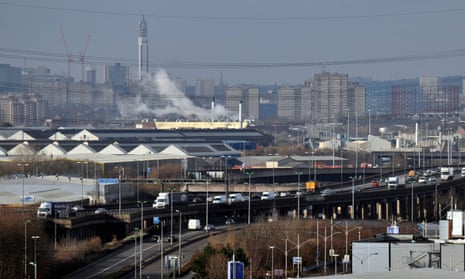Primary school children who grow up in Birmingham could lose half a year of their lives due to illegal levels of air pollution in the city, a new report warns.
The study examines levels of nitrogen dioxide and particulate pollution (PM2.5) in the city and calculates that an eight-year-old child could die up to seven months early if exposed over their lifetimes to toxic air. The loss of life expectancy is worse in Birmingham than some other major cities in the UK including Manchester, researchers found.
Birmingham is one of five cities required by the government to set up a clean air zone to reduce toxic air, as part of plans to tackle the illegal levels of pollution in 38 out of 43 areas of the country.
But in Birmingham and Leeds the start date of January next year has been postponed because of government delays in providing vehicle-checking software.
On Monday research commissioned by UK100 – a network of local leaders across the country – for the first time examines the burden air pollution places on mortality in major cities.
The report, carried out by Kings College London, said the health cost of the city’s toxic air was £470m every year.
The study examined NO2 and PM2.5, two of the leading causes of poor health from air pollution, in the city’s 10 constituencies. It found that air pollution had the greatest impact in the most deprived areas, and that men are more likely to be affected than women. In Erdington, up to 91 deaths are attributable annually to air pollution, compared with up to 59 in Edgbaston and 57 in Hall Green.
More than half of children in Birmingham live in the top 10% of the most deprived areas of the country, and about 8,000 children in the city are growing up in the most disadvantaged neighbourhoods in the UK, according to a report by the Children’s Society.
Waseem Zaffar, cabinet member for transport and environment on the city council, said the results were shocking.
“They demonstrate the sheer scale of the major public health crisis we are dealing with in Birmingham today,” he said.
“One life cut short by poor air quality is one too many, so this is exactly why the city is taking forward measures such as the clean air zone and why we continue to work with other cities across the country to tackle this problem together, but we also need strong leadership on this issue at a national government level.”
Sue Huyton, coordinator of the Clean Air Parent’s network, said action was needed now.
“It’s awful that children living in the UK are breathing air that may shorten their lives. As a parent, you want to do everything you can for your children, but when it comes to air pollution you can feel helpless – that’s why those in power must step up.
“We need the government and Birmingham city council to take ambitious action to tackle the toxic air in this city, and we need them to do it now.”
Air pollution has been identified by Public Health England as the largest environmental risk to public health in the UK. Evidence shows that it can cause or worsen a range of lung and heart conditions including asthma, chronic bronchitis, chronic heart disease and stroke. Research suggests air pollution caused by NO2 and PM2.5 could cause 36,000 deaths per year.
Polly Billington, director of UK100, said the report should be a wake-up call to policy makers.
“We need to tackle this invisible killer which is cutting the lives of children and causing health misery for thousands of adults. By working together, local councils and central government can put in place ambitious and inclusive clean air zones to tackle the most polluting sources of dirty air and let us breathe freely.”
The government has been forced by the courts to improve its plans to clean up the air, after losing legal action taken by environmental lawyers Client Earth.
A government spokesperson said: “We are aware of concerns over delays and are carrying out work to develop key components of the system to support the Charging Clean Air Zones for January 2020.”
